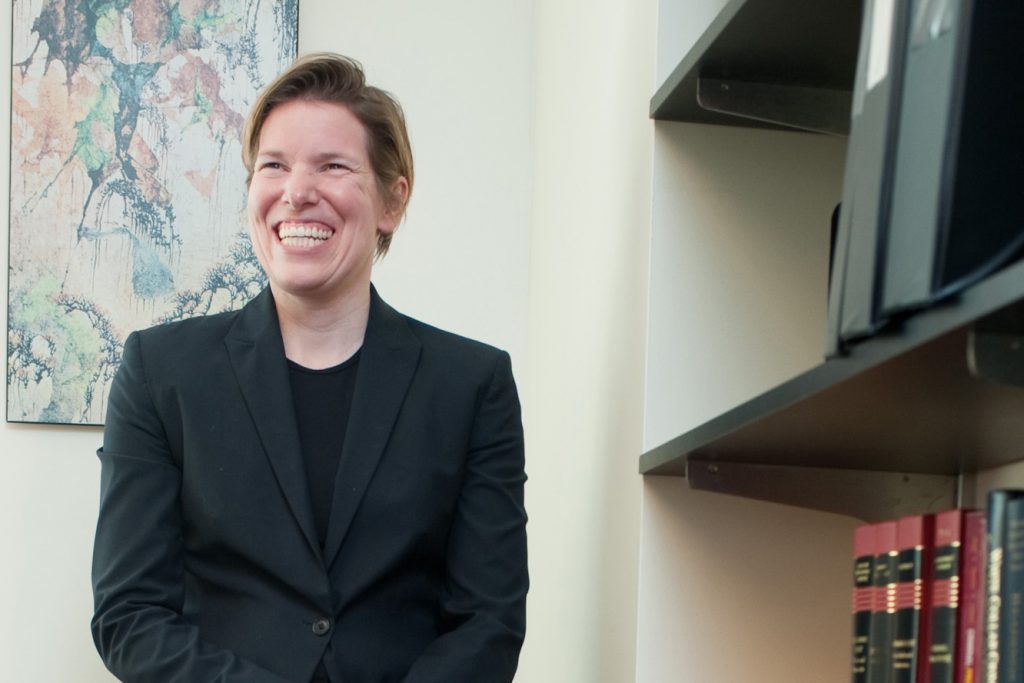Picking up where one of her students left off, BC Law Professor Kari Hong delivered a substantial victory in the 10th Circuit Court of Appeals on December 14 on behalf of asylum seeker Joachim Addo. After two previous agency denials, the 10th Circuit granted a petition for Addo, giving him an opportunity to live in safety after being forced to flee from his home country, Ghana, in 2017.
What started as a supervised experiential learning experience for an inspired student turned into a case Hong could not step away from.
“Bianca Difini (LLM ’17) came to my office one day, asking if she could do something to help asylum seekers who were under attack by the Trump administration. I was busy, but was moved by her desire to help someone in need,” Hong said.
After selecting Addo’s case with the help of the Catholic Legal Immigration Network (CLINIC), Hong supervised Difini as she filed a brief with the Board of Immigration Appeals, asking the agency to reverse the decision of the Immigration Judge who denied relief to Addo. Within three weeks, the Board of Immigration Appeals (BIA) issued a decision agreeing with Difini’s arguments that the Immigration Judge had wrongly denied asylum.
On remand, however, the Immigration Judge denied the case again on different grounds. Difini had graduated by that time, leaving the case in the hands of Hong, who decided to take the case to the 10th Circuit Court of Appeals.
The details of Addo’s situation in Ghana, coupled with the events leading up to the most recent decision, display a fault in the asylum analysis system currently used by Immigration Judges in America, Hong said.
BC Law Professor Daniel Kanstroom described the situation this way: “This is an important asylum issue that Immigration Judges seem to be getting wrong with distressing regularity; so, it is important that they be corrected.”
Addo is the son of the chief of the Challa tribe in Ghana. Land disputes between the Challa and the neighboring Atwode tribe began in 2005 due to repeated lease violations by the Atwode. Addo’s father instructed his tribe to stop leasing land to the Atwode and defeated them in multiple court cases over the land disputes. The Atwode responded with violence against the Challa and vowed to eliminate Addo’s father and family.
From 2012 to 2017, Addo and his family were subject to constant threats and attacks from the Atwode tribe. Multiple instances of physical attacks on Addo, his wife and his brothers, the assassination of his uncle, the burning of his home, and multiple failed murder attempts led Addo to relinquish his standing as heir-apparent to the Challa chiefdom and relocate three times before a final attempt on his life—a bullet shot through his bedroom window while he was sleeping— forced him to seek asylum in America.
In the first denial of asylum the Immigration Judge concluded that Addo had failed to prove that he was, in fact, the son of the Chief of the Challa tribe. After proving that he was the son, the Immigration Judge denied asylum again, concluding that Addo could successfully relocate in Ghana.
With the help of Hong, Addo submitted a petition to the 10th Circuit. The petition was granted in a decision that very pointedly called the BIA’s reasoning flawed.
“The Trump administration has made over 400 rule changes to immigration law, which puts tremendous pressure on immigration judges to deny people’s claims. It really does beg the question, ‘Who on earth could get asylum if this person can’t?’” Hong said. “How many other people have been deported, in my opinion wrongly, trying to fight back against this system that is tipped against them?”
In an opinion piece for immigrationcourtside.com, former Chair of the Board of Immigration Appeals and former Immigration Judge Paul Wickham Schmidt praised the 10th Circuit for correctly applying the law to Addo. “Had the case been handled properly in June 2017, [Mr. Addo] would have been granted asylum, be a green card holder, and on his way to achieving citizenship. Instead, Professor Hong has to hope that she can get him back to the US while he’s still alive!”
Chairman Schmidt continued by saying, “Perhaps the ‘new [Executive Office for Immigration Review] EOIR’ should hire Professor Hong to provide some real expert training on asylum law. Or, better yet, appoint her to an appellate judgeship at the BIA where she can lead a “renaissance of competence” in due process and fair asylum adjudication at EOIR and teach by example!”
Chairman Schmidt added, “Thanks, Professor Hong, to you and your dedicated ‘crew’ at BC Law for all you do…for American Justice!”
Grateful for the accolades, Hong nevertheless took care to emphasize that none of this would have happened were it not for the initiative of her former student, Bianca Difini. “Bianca is now at Facebook, but she was the person who started this process,” Hong said. “Mr. Addo will now be able to live in safety because of her efforts.”


